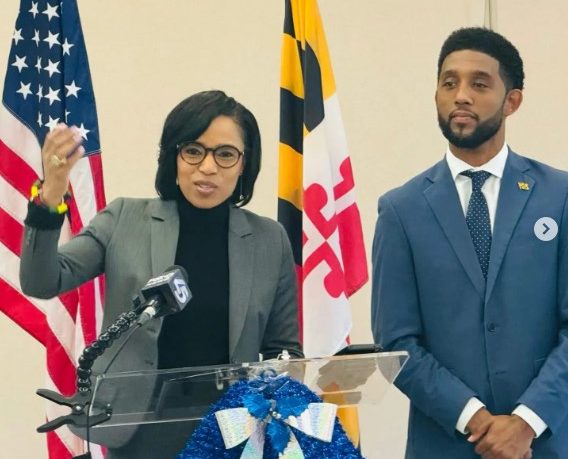By Roger House,
Word in Black
The campaign of Maryland’s Angela Alsobrooks for the U.S. Senate may be the most consequential election facing Black Democrats in 2024. That’s because her candidacy can serve as a springboard to a more inclusive Senate chamber and to the consolidation of Black political power in a Southern state.
Alsobrooks is the county executive of Prince George’s County, a suburban powerbase for affluent Black families in Maryland. She is a former state’s attorney for “PG County” as well. A lifelong resident of Maryland, she announced her candidacy to fill the seat of Democratic Sen. Ben Cardin, who will retire in 2024. If elected, she promises to focus on legislation aimed at bolstering the economy and reducing crime, among other priorities.
There are six candidates in the state’s Democratic primary, including Rep. David Trone (D-Md.), a three-term member of the House of Representatives. Also trending is Will Jawando, a progressive member of the Montgomery County Council. Alsobrooks and Trone are considered the leading candidates, but Trone holds a financial advantage as the founder of alcohol retailer Total Wine & More. He has put nearly $10 million of his own money into the campaign.
Sign up for our Daily eBlast to get coverage on Black communities from the media company who has been doing it right for over 130 years.
Alsobrooks has raised about $1.7 million in recent months. It is an overall strong fundraising performance, but her campaign is at a stark financial disadvantage. This should raise alarm bells with supporters on a number of levels.
The Senate Glass Ceiling
Black women have decried their lack of representation in the Senate since the departure of Kamala Harris, who made history as the first Afro-Asian woman elected from California but opted to leave for the historically symbolic — but relatively unimportant — vice presidency. Since then, advocates like Rep. Barbara Lee (D-Calif.) have called on party leaders to help a Black woman get elected to the Senate. That’s because across history, only two Black women have made it to the chamber: Harris (2017-2021) and Carol Moseley Braun of Illinois (1993-1999).
Advocates urged action after the death of Sen. Dianne Feinstein (D-Calif.). California Gov. Gavin Newsom attempted to quell the stir with the one-year appointment of Laphonza Butler, a former president of the political action group Emily’s List. The appointment did little to placate the hopes of Black women for a full-term senator.
Some have looked to the Senate campaign of Rep. Lee, who announced her candidacy after Feinstein’s death. Lee has been a dedicated representative of the Oakland community since 1998. However, the voting power of Black people in California has been in decline for years with the loss of population. To date, Lee polls far behind the better-funded campaigns of Reps. Katie Porter (D-Calif.) and Adam Schiff (D-Calif.), who earned a national profile as the leader of the Donald Trump impeachment hearings.
Then there is the senate campaign of Rep. Lisa Blunt Rochester, the sole House member of the small blue state of Delaware. She is the handpicked replacement of the retiring Sen. Thomas R. Carper. Rochester may very well cruise into the Senate as an overall favorite of Black voters and White liberal Democrats. While she may benefit, however, one can question whether the role of the statewide Black community will be enhanced as well.
Delaware, like Maryland, can fly under the radar as a state with a sizable Black population of about 23 percent. Yet, the community lacks the organization and talent pool of professionals that fuel the larger Maryland. Her campaign could further the cause of a more inclusive Senate chamber but little more.
It means that the national Black leadership must be conscious of putting its limited resources into a campaign with both good odds and the chance to forge a strong statewide organization. That’s where the Senate candidacy of Angela Alsobrooks is worth a look.
The New Capital of Black America
The politics of Maryland is a game-changer in the American political experience. Black people comprise about 30 percent of the 6 million population and more than half of the Democratic base. They are organized in a suburban-urban coalition that can exercise influence in the state, unlike in other Southern states.
The drivers of the coalition are the affluent suburban counties that border Washington, foremost Prince George’s County with a population of 900,000, of which about 60 percent is Black. The engine of the coalition is the rough-and-tumble city of Baltimore, which can bring to bear about 600,000 voters for candidates seeking statewide office.
As such, Maryland stands out as a symbol of the rise of a Black-led democracy with a fair chance of sustainability. Voters made history in 2022 with the elections of Wes Moore as governor and Anthony Brown as attorney general. Their confidence in a strong Black voter base provides leeway for shaping an agenda of equity in state policy.
Maryland has the favorable condition of a large pool of educated, middle-class Blacks drawn to the Washington job market. Gov. Moore, an example of this class, has the background to mobilize a large Black voting bloc and build alliances across race and ethnic lines.
As such, the Free State offers an opportunity for Black professionals to forge a statewide power base — and, by extension, to gain experience in how the state can be an instrument for negotiations with other states and the federal government, and how it can provide a pathway for relations with African countries under initiatives such as President Biden’s summit on trade.
The Angela Alsobrooks campaign will build on the Moore and Brown elections; her victory would be a “triple crown” for the Black community. And it may encourage young people to consider work in the unglamorous but critical field of state governance.
Under Moore, for example, Maryland is one of the few states to prioritize the inclusion of historically under-represented Black labor in civil construction. It is promoting the equity provisions in President Biden’s $1.2 trillion infrastructure law for the Frederick Douglass Tunnel project to rebuild the 150-year-old Baltimore and Potomac Tunnel.
The project is expected to generate 30,000 skilled jobs, most of which do not require a college degree. The state has identified nine associated projects, which encompass $9 billion in investment and 11,000 jobs, for “pre-hire collective bargaining agreements (PLAs) between labor unions and employers.” In addition, Baltimore pledged to require PLAs on six projects, valued at $30 million, that will create more than 100 skilled jobs.
A Model for Moderate Southern States
Maryland can serve as a model for the emerging Black political class in other moderate southern states with strong economies — Virginia, North Carolina and Georgia. As I have suggested, Democratic and community strategists should consider a “Four State Project” to accelerate racial democracy in the South. It would entail the recruitment of middle-class voters from the politically repugnant states of Texas, Florida and the Mississippi Delta region.
Just like recruiters are doing in border states and “sanctuary cities” for immigrants both legal and undocumented, Black political recruitment should include assistance with relocation expenses and information on jobs and housing.
Roger House is associate professor of American Studies at Emerson College and the author of “Blue Smoke: The Recorded Journey of Big Bill Broonzy” and “South End Shout: Boston’s Forgotten Music Scene in the Jazz Age.” His forthcoming book is “Five Hundred Years of Black Self Governance” by Louisiana State University Press. A version of the commentary appeared in The Messenger.
This article was originally published by WordinBlack.
Get your AFRO A CARD today!
Help us Continue to tell OUR Story and join the AFRO family as a member. Members will receive exclusive journalism, and directly support the future of the AFRO. You can choose from three membership plans below.



